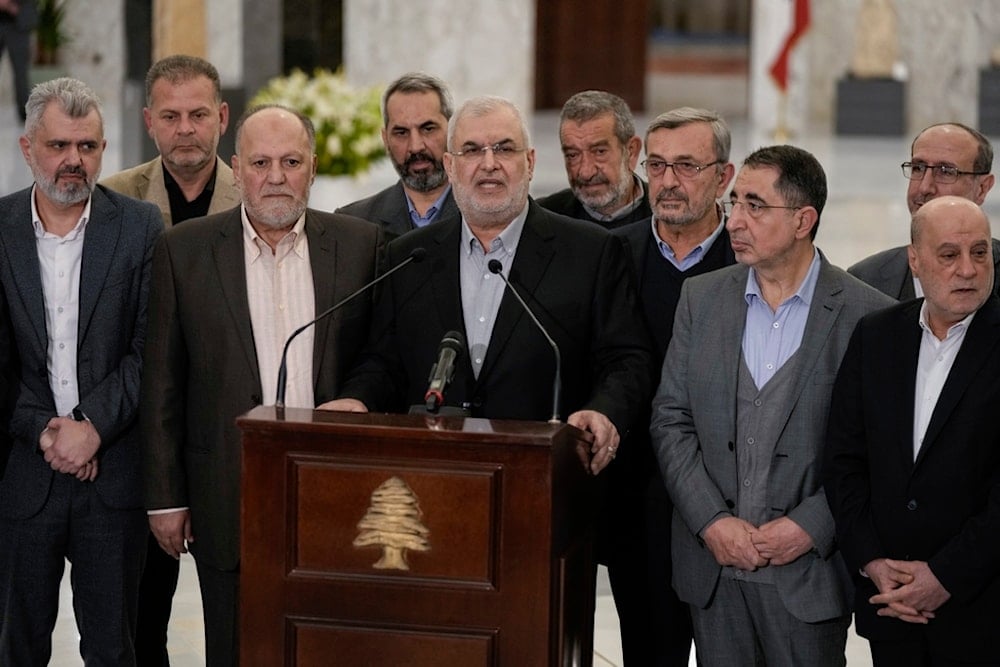Raad: Disarming Hezbollah 'suicide',endangers Lebanon’s sovereignty
Hezbollah MP Mohammad Raad warns that giving up resistance weapons is “suicide,” exposes Lebanon to Israeli interference, and threatens national stability.
-

The head of Hezbollah's parliamentary bloc, Mohammed Raad, center, speaks to journalists after his meeting with Lebanese President Joseph Aoun, at the presidential palace in Baabda, east of Beirut, Lebanon, Monday, Jan. 13, 2025 (AP Photo/Bilal Hussein)
Mohammad Raad, head of Hezbollah’s parliamentary bloc Loyalty to the Resistance, told Al-Manar TV that the US and Israeli push for a timetable to implement demands on the Lebanese government “comes because time is not in their favor.”
“The presence of the resistance is what truly disturbs them,” Raad said, warning that “the decision to disarm [the Resistance] reveals to the enemy an arena for tampering with internal stability, and the goal may be to make it an internal problem instead of a Lebanese-Israeli one.”
Raad revealed that “on Tuesday, diplomats under US pressure contacted some figures to call the president and congratulate him.” He added: “The state, with its own capabilities, can ensure its authority, but it cannot confront the enemy. The resistance’s weapons have protected Lebanon from 1982 to 2025, liberated and triumphed, created a balance of deterrence, and brought down the enemy’s expansionist project.”
'Handing over weapons is handing over our honor'
Describing the decision as “hasty and dangerous,” Raad stressed that it “exposes sovereignty” and “opens the door for the enemy to tamper with domestic stability.”
“To say ‘hand over your arms’ is to say ‘hand over your honor.’ Handing over our arms is suicide, and we do not intend to commit suicide,” he declared. “Ask the army if they would hand over their arms, which is their honor. Would they invite the world to betray us by giving up their arms? If we hand over our arms, who will safeguard our sovereignty and protect our country?”
He continued: “Even if we fell short, is it not shameful to deny the role of the resistance and the martyrs? We asked for guarantees to implement the clauses in the American paper, but none were given. We are with extending the authority of the state and limiting arms to it when it is capable of forcing the occupation to withdraw and protecting the country.”
Raad said he told officials: “If we hand over our arms, can you guarantee that the Israelis will not demand something else? They told me, ‘When that time comes, we’ll see.’”
Warning of internal tension
“I want security and stability, but under the government’s decision, there can be no guarantees for anything. The political decision-maker bears responsibility for every consequence of the decision,” Raad cautioned. “We tried to correct the decision but found insistence. We accepted the ministers’ return to correct it, but they insisted on discussing Barrack’s paper so the Americans would approve of them as obedient.”
He added that “the decision could have been delayed,” but pressure from outside forced it forward.
“There are problems within the authority, and intervention from an American envoy, and others with more influence inside the authority,” he said. “Those who contributed to approving the disarmament are either foolish, acted irresponsibly, or committed a sin that pushes us towards difficult choices.”
On whether Hezbollah will remain part of the government, Raad stated: “Hezbollah has not taken any decision yet. We are keen on peace, but after this decision, we do not know what the guarantee of civil peace is. The decision is dangerous, and how can we guarantee its repercussions?”
Criticism of state capacity and foreign influence
“We do not change our principles, while many in the world change theirs like changing clothes. In the shared space, you have attacked our share, which is our security. How can the army, whose salaries are paid from abroad, protect us?”
Raad explained why Hezbollah accepted a ceasefire: “The moment the ceasefire happened, we had proven on the battlefield that the Israelis could not advance on the ground, and we did it for the sake of our partners in this country.”
He criticized the refusal to delay the weapons discussion until a defense strategy could be addressed: “They didn’t want that. After the martyrdom of our most senior leader, our attachment to and love for Speaker Berri increased, and coordination with him intensified.”
On Syria and Gaza
Raad said Hezbollah has not issued a position on recent political developments in Syria because “the picture is still volatile, unstable, and subject to fluctuation at any moment.”
“The enemy has not been able to resolve even one front it has opened,” he added. “Its decision to occupy Gaza means it has opened a new file against itself.”
'US proposal aids Israeli agenda'
The Loyalty to the Resistance Bloc warned Thursday that Lebanon and the wider region are undergoing one of the most dangerous phases in recent history, facing existential threats to their sovereignty, geography, and economy. In a statement following its regular meeting, the bloc denounced the escalating Israeli aggression, backed by the United States and certain Western and Arab powers, as part of a broader campaign aimed at redrawing regional balances at Lebanon's expense.
At the heart of the bloc's condemnation is the Lebanese government's recent endorsement of a proposal put forward by US envoy Tom Barrack. The bloc described the move as "a clear reversal" of the government's ministerial commitments and a breach of the presidential oath. It stressed that the paper contradicts the foundational principles of the Taif Accord, which guarantees Lebanon's right to self-defense and the preservation of national sovereignty.
The bloc described the government's endorsement of the US paper as "suspiciously hasty and unjustifiable," warning that such a position constitutes a "clear violation of the National Pact" and threatens to strip Lebanon of one of its greatest sources of strength: the Resistance.

 6 Min Read
6 Min Read








